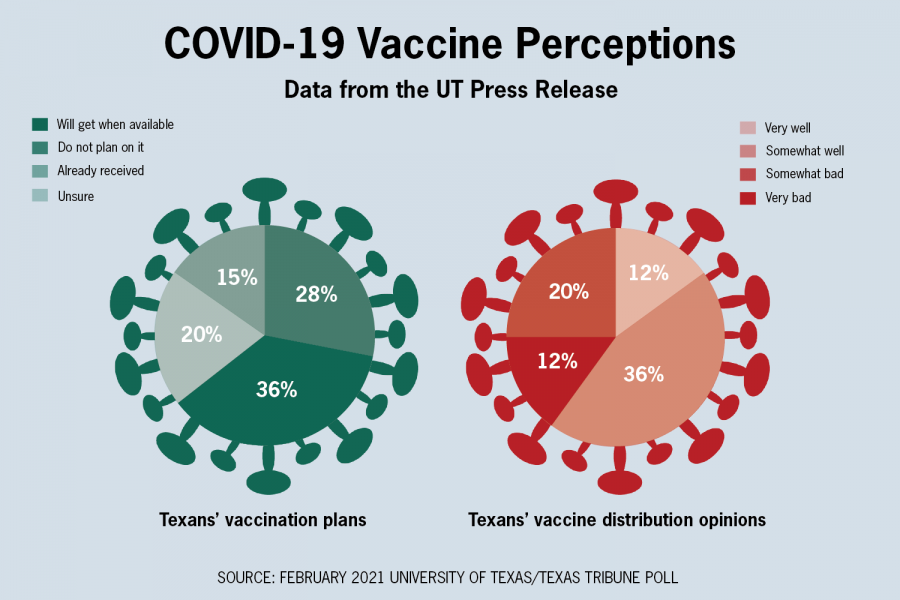More than 25% of Texans skeptical of COVID-19 vaccine, UT-Austin/Texas Tribune poll shows
March 28, 2021
Around 28% of Texans have no plans to receive a COVID-19 vaccine, even though current vaccines are clinically safe, according to a February poll from UT and The Texas Tribune.
On Tuesday, Texas announced all adults above the age of 16 will be eligible for the COVID-19 vaccine starting March 29. According to the Centers for Disease Control and Prevention, all vaccines given in the U.S are safe and effective for most of the adult population.
“What this data continues to illustrate is that there’s a demand problem in the making,” said Joshua Blank, director of research for the Texas Politics Project. “If not enough Texans and Americans are willing to get the vaccine, we can’t achieve herd immunity.”
Blank said there is “probably a larger well of skepticism toward vaccines in general.”
“We know certain populations are usually affected more because of historical events and other things that have happened to influence vaccine hesitancy,” said Amy Young, chief clinical officer for UT Health Austin. “If 72% of the inhabitants of the state of Texas got vaccinated, I would be very, very happy, because the vaccine is so effective. Seventy percent herd immunity would be great.”
A December 2020 survey found that 53% of white Americans planned on getting the vaccine while 24% of Black Americans did, according to the AP-NORC Center for Public Affairs survey. A history of racist medical malpractices, such as the 40 year Tuskegee experiment, contribute to hesitancy in Black communities surrounding the COVID-19 vaccine. In the 1932 experiment, 600 Black men from Tuskegee, Ala., 399 with syphilis and 201 without, were passively observed and left untreated for scientists to study the effects of the disease. Even after penicillin was approved as a treatment drug in 1947, the men were not offered it, and most died from syphilis-related conditions.
Blank said political party affiliation and residency of those surveyed had little correlation with vaccine hesitancy.
UT is currently designing efforts to confront vaccine skepticism, said Susan Hochman, associate director of assessment, communication and data informatics for University Health Services.
“We are working on a campaign to address vaccine hesitancy specifically among a number of different populations, but we will have one that addresses vaccine hesitancy among students,” Hochman said.
UT’s own vaccine distribution has been ongoing since December. Eligible patients report to Gregory Gym at their scheduled appointment time to receive their vaccine and immediately schedule their second dose on site.
Jonathan Robb, director of the Office of Emergency Preparedness, said UT had a “streamlined” process.
“As we get more and more people, there’s the possibility that there could be lines associated with it, but we go through and we have a good flow through our process,” Robb said.
Young said UT Health Austin’s automatic scheduling of the second dose helps ease patients’ fears regarding the vaccine.
“Vaccine hesitancy is a problem and communications folks have done some work and are continuing to do work in that area specifically to address vaccine hesitancy,” Young said.












